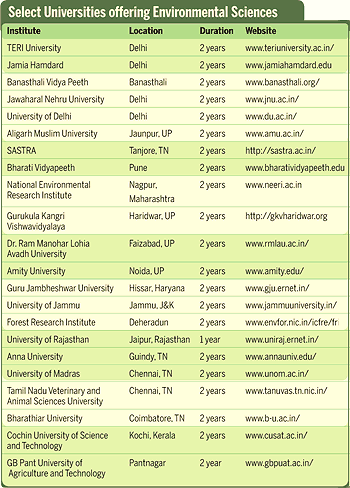
Alan M. Eddison had said, "Modern technology owes ecology an apology". Environmental Sciences as a discipline emerged in response to concerns of pollution, depletion of natural resources, and general deterioration in the living environment. Though it's concerns encompassed plants, flora and fauna, and animal life, it primarily was focused on human habitat. In terms of career, you can become an environmental scientist, environment educationist or environment-related technologist working in laboratories that engage in soil and water testing, pollution detection and control. And as a discipline it draws from basic sciences primarily and few universities do provide inputs drawn from politics, socio-economics and law.

Are you eligible?
As a general rule, students opting for this degree should possess a BSc or equivalent degree in natural sciences, chemistry, environmental science, agriculture, geography, environmental economics or engineering. Work experience is preferred by some institutes when you opt for an MSc in Environmental Science, so do keep that in mind before applying.
Basic knowledge of mathematics, physics and chemistry is a prerequisite, as is computer literacy. According to Dr. Prateek Sharma, Associate Dean, Faculty of Applied Sciences at TERI University, if you possess a genuine interest in environmental issues, you can excel in this field.

What do they teach you?
Curriculum varies from institute to institute. To ensure that you opt for the degree of your choice closely study the syllabus before zeroing in on an institution. Some like JNU, Pune University and FRI offer science-heavy degrees with little or no policy input. Some others like TERI, and NEERI, offer a balance between environment and policy.
A range of specialisations are normally on offer especially in science based MSc programmes (See box alongside). A dissertation is also part of the degree requirement. The dissertation helps the students in applying the concepts learned to a real life situation. It also enables one to identify and specialize in one's chosen field. Some institutions have introduced the concept of internships as well.
An MSc in Environmental Science programme primarily provides one with the knowledge and skills to perform scientific and technical research that helps in achieving an accurate assessment of the current environmental issues and arriving at solutions for the same. For assessment or mitigation, scientific tools play a dominant role in the curriculum and thus in the defining of any environmental problem. Hence aspiring students must not confuse ecology with environmental sciences, though the difference is slowly blurring.
Career360, is a complete career magazine

If it is a science heavy degree that you are looking at, then universities like JNU, Delhi College of Engineering, Pune University, SASTRA amongst others would be the best bets. Policy-oriented degrees are only a few in India.
TERI offers one of the best policy oriented MSc environment degrees. Another interesting non-degree programme is the one offered by the Centre for Environment Education, Ahmedabad. Lasting nine months, the course provides training in wasteland development, water conservation, forest management, pollution, health and sanitation, eco-development etc.
This course is open to professionals such as teachers, administrators, activists and media persons. Dr. Prateek Sharma feels that university courses are intensive in nature. His advice to people entering this field is to not compare themselves to others from fields such as MBA etc. in terms of salary packages.
An MSc in Environmental Science would on average receive Rs 25,000 to begin with and has wide scope for improvement with experience and exposure. But the cost of entry too is minimal. While public universities charge a pittance, even a private university like TERI charges only 1.6 lakhs for a two-year programme.

A career as an environment engineer, or a professional in the field of water resource engineering and management, environmental scientist, solid waste management, air pollution management, water quality management, land conservation, eco-tourism, environment journalism and environmental law are some of the opportunities in this field.
With Corporate Social Responsibility initiatives being taken up by most companies on a global platform, opportunities for an environment science professional are endless. You can also consider a career as a scientist -- perhaps develop specific tools in your area of specialization and become an expert in a field such as remote sensing.
There is also scope for work at an international level and also within the government sector. Plan ahead and work towards contributing to a desirable change in terms of the current climate change scenario and future needs.
For those who have developed essential skills, work on areas bordering more on mitigating environmental degradation naturally rather than using hard science would also be an exciting career option. Some, however, would term that more suited to an ecologist rather than the environmental scientist. Marya Mannes, as early as 1958 had stated, "The earth we abuse and the living things we kill will, in the end, take their revenge; for in exploiting their presence we are diminishing our future".
This surely is something to remember and act upon for all who choose environmental science as their area of academic pursuit in particular, and for society at large.